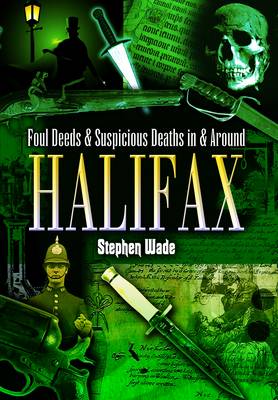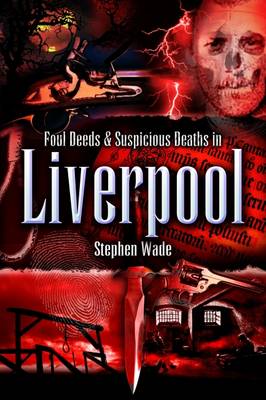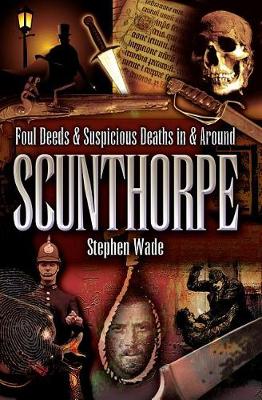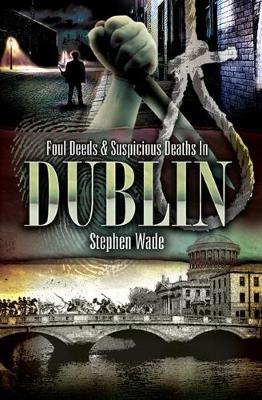Foul Deeds and Suspicious Deaths
5 total works
Calderdale has gone down in the annals of crime in England as the birthplace of Christie of Rillington Place, and as the haunt of the Yorkshire Ripper. But there is much more in the criminal history of the Halifax area to interest the reader with a taste for true crime. As a town with a shifting population of labour for the new mills of the Industrial Revolution, Halifax in the nineteenth century was a focus for urban disorder and lawbreaking. This book tells some of the tales from this period of social history, and from earlier times, when feuds and brutal punishment for crime were the order of the day.Here are the accounts of murders within the family, but also sad suicides and tragic assaults, public riots and violent vendettas. Every northern town has its darkunderbelly beneath the visible civic progress and commercial achievements Halifax and the cluster of towns nearby have had plenty of this nasty side of history, and these pages recount some of the most heinous and vicious crimes recorded between the anarchy of the Middle Ages and the dark twentieth century.
The author, a graduate of Leeds University, is a social historian with a special interest in the chronicles of law and crime in the north. He has been a lecturer at the University of Huddersfield and has edited a number of books on literature and history with a regional context. He is currently working on Unsolved Yorkshire Murders, also published by Wharncliffe Books. He is planning to teach a course on the writing of crime in local history at the University of Nottingham.
The author, a graduate of Leeds University, is a social historian with a special interest in the chronicles of law and crime in the north. He has been a lecturer at the University of Huddersfield and has edited a number of books on literature and history with a regional context. He is currently working on Unsolved Yorkshire Murders, also published by Wharncliffe Books. He is planning to teach a course on the writing of crime in local history at the University of Nottingham.
These stories from the dark history of Liverpool inform us of the violent and tragic lives of people caught up in poisionings, brawls and riots. Some tales are set in families suffering serial murder, others are gun crimes and attacks in the tough dockalnd of the city. The reader interested in criminal tales of this vilolent and divided city will learn about such bleak acts as: Bodysnatching for the Anatomists A Poachers deadly revenge War-time rackets Killers sent to the gallows via Walton Prison and many more
Doncaster has world-wide fame as a railway town. For many years the name was associated with engineering, transport and of course coal. But there is a darker aspect to its history. The sinister side is explored through the research and writing of an experienced crime historian. Sensational tales have been uncovered concerning a variety of dark deeds, including a cloak-and-dagger meeting in an Elizabethan tavern and the murder of a Civil War leader. Over the years Doncaster and district has been the scene of riots, Suffragette militancy, terrible domestic tragedies, sad suicides and brutal murders. The stories here range from the notorious Baccarat Scandal which shocked Victorian society to a betting-room robbery at the races. The author also reminds us about famous criminals associated with the town, as well as a Prince and a hangman, a notorious fraudster , even a London playboy. Shocking, surprising, at times chilling but true, a new layer of the town's social history is now available for the first time; but not for the feint hearted.Stephen Wade is a professional writer specialising in regional crime.
He has written several volumes for Wharncliffe's acclaimed Foul Deeds series. His most recent books include Tracing Your Police Ancestors and Britain's Most Notorious Hangmen. Tracing Your Criminal Ancestors and Cold Cases Revisted, a casebook of DNA forensics in major crime investigations, are forthcoming. He lives near Scunthorpe.
He has written several volumes for Wharncliffe's acclaimed Foul Deeds series. His most recent books include Tracing Your Police Ancestors and Britain's Most Notorious Hangmen. Tracing Your Criminal Ancestors and Cold Cases Revisted, a casebook of DNA forensics in major crime investigations, are forthcoming. He lives near Scunthorpe.
North Lincolnshire and Humberside is an area with more than its fair share of violent history. Although mainly rural, the region has been notorious in the annals of crime, from the rebellion known as the Pilgrimage of Grace (1536) to the sensational murder cases of the twentieth century. Scunthorpe, created when several villages amalgamated as the iron and steel industry grew in the Victorian period, is the centre of a cluster of places with extreme crime in the locality, from the lawless wastes around the Isle of Axholme in the West, to the port of Barton towards the Humber. Scunthorpe has had its fair share of foul murder, especially when it expanded to cope with an influx of labour for the 'Works' at Normanby and Appleby-Frodingham. In many cases, killings and attacks were 'domestic' as men cracked with stress and alcohol. But the town also had its war-time night-stalker and its sad unsolved killings. The book tells these tales, and many more, from Epworth to Brigg, and from the fields and the mean streets.
Dublin has always been a city of paradoxes, opposites and conflicts. Its population expanded rapidly throughout the nineteenth century, despite the great famine and emigration to England, America and elsewhere. Even if we leave out the crime related to political upheavals and dissensions, as the author does in this book, there is still a long and fascinating social history of crime in the story of this wonderful,energetic and cultural city - the pride of Irish achievement in the arts and literature. It is a city of gaols as well as municipal and grandiose architecture. Maps through the centuries show its many prisons, from a Newgate to a Bridewell and several major ones such as Kilmainham and Mountjoy. At times in the eighteenth century the street crime was beyond the strength of the law to manage. This collection of stories include murders, robberies, frauds, libels and even a strange and bizarre offence by a Russian priest; and a killing by a crazed army officer. Here we have tales of courtroom drama, murder in the streets and sensational investigations.
The people who figure in these 'strange eventful histories' include Oscar Wilde's father, Jim Larkin, and the working-class hero and the artist, Kirwan, condemned to prison on the horrendous Spike Island.
The people who figure in these 'strange eventful histories' include Oscar Wilde's father, Jim Larkin, and the working-class hero and the artist, Kirwan, condemned to prison on the horrendous Spike Island.




